Video Dispatches: ROCK HUNTER, TARNISHED ANGELS, FAR FROM HEAVEN & COLUMBUS
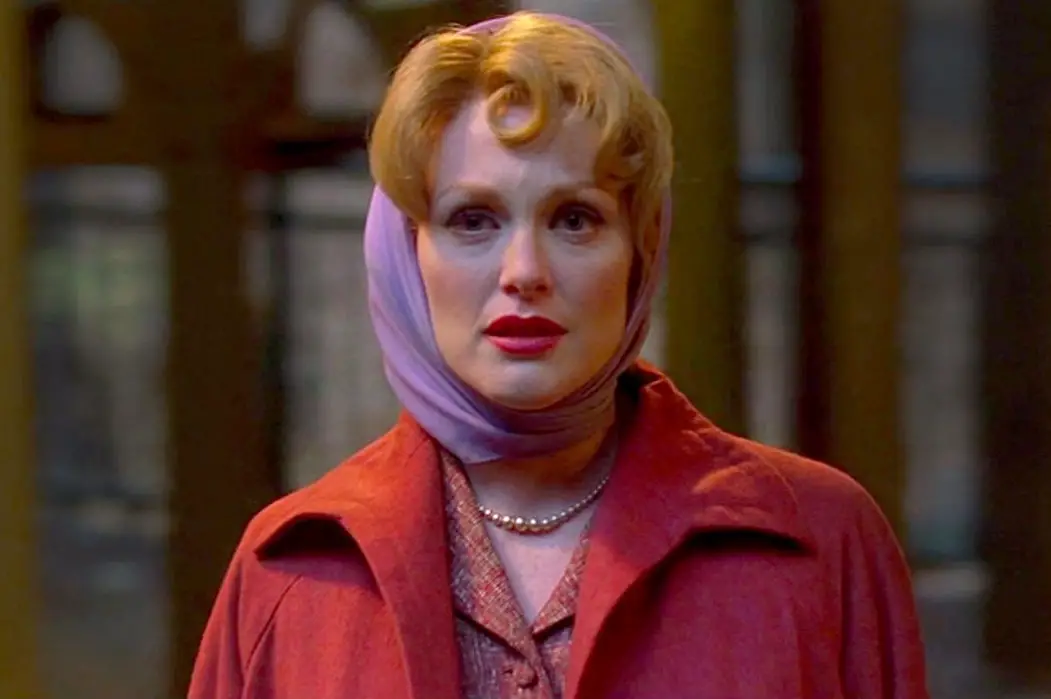
Midwesterner, movie lover, cinnamon enthusiast.
Video Dispatches is a regular digest of recent home video releases.
Will Success Spoil Rock Hunter? (1957) – Twilight Time
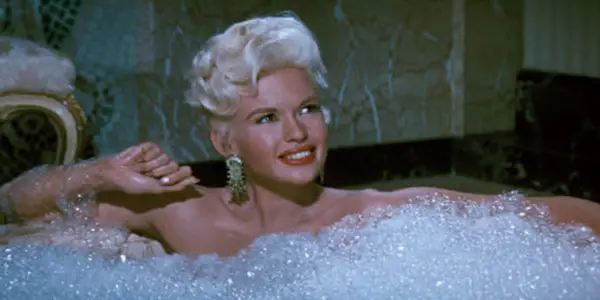
In Julie Kirgo’s booklet essay, she calls Frank Tashlin’s Jayne Mansfield and Tony Randall-starring media satire Will Success Spoil Rock Hunter? “genuinely avant-garde,” referencing the jarring and unique opening credits — which has Randall left-of-frame, bungling the introductory music and credits — and the film’s sudden, mid-way interruption where Randall addresses the audience, condescendingly commenting on the screen size of television exhibition versus CinemaScope (of which this film presents beautifully). Meanwhile, Tashlin formally plays with the screen, closing Randall into a tiny, curved-corner TV frame.
Kirgo, as well as the Twilight Time box copy, make significant note of Jean-Luc Godard’s adoration of Tashlin’s film, something Jonathan Rosenbaum wrote about in 2006 for the Chicago Reader before its repertory screening at the Gene Siskel Center. He said it was “the template for Godard‘s bold use of primary colors and ‘Scope in the ’60s,” implying works like A Woman is a Woman, Weekend and Pierrot le fou.
Outside of aesthetics, it’s easy to see Will Success Spoil Rock Hunter? appealing to the thorny, and frankly, pretentious taste of the likes of Godard, known for his pithy, convenient line in Godard on Godard, “When you go to the cinema, you look up, when you watch television, you look down.” Will Success Spoil Rock Hunter? is guilty of the same injustice, at least in the silly mid-way interruption — the type of high-brow medium posturing that would have and still will appeal to cinephiles. But when Tashlin sticks his sights on nefarious advertising mechanics, the picture zings. More interesting than its appeal to Godard, is Rosenbaum’s point that Tashlin, like his mentee Jerry Lewis, made films that appealed more to the French, contemporarily considered vulgar by American moviegoers.
Though this release can’t boast a robust booklet like Eureka!’s 2010 release on their Masters of Cinema label, due to a superior visual presentation and commentary track from film historian Dana Polan, Twilight Time can be proud to have released the definitive release, to date, of Will Success Spoil Rock Hunter?
The Tarnished Angels (1957) – Kino Lorber Studio Classics
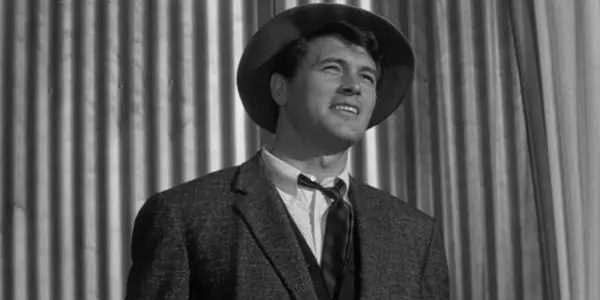
Douglas Sirk’s The Tarnished Angels, a Rock Hudson-starring adaptation of William Faulkner’s Pylon, is another title hitting the U.S. years after its Blu-ray premiere via Eureka!’s Masters of Cinema. As is Kino Lorber Studio Classics’ protocol, the release is fairly bare bones, though its commentary track by Imogen Sara Smith is nothing to sneeze at.
While this release is less of a boon for U.S. region-free collectors than it is for the region-locked, the presentation here is quite lovely. Sirk, taking a break from the unshackled Technicolor he’s most associated with (i.e. Magnificent Obsession, Written on the Wind and All That Heaven Allows) but losing none of his emotional earnestness or careful composition in this tender love triangle during 1930’s New Orleans.
The film, which Bosley Crowther called an absurdly acted, cheaply written piece of hot air upon its release, is necessarily quite different from Faulkner’s novel in order to pass censorship. Having not read the source, I was confused by the poster boasting Pylon as “the book they said couldn’t be filmed!” Apparently, the central trio engage in a threesome in the novel, which the censorship board was, of course, far too prudish for in the late ‘50s. However, knowing as much about the source might explain why the three characters get along with such a refreshing civility, rather than cutthroat competition.
Writing for the Chicago Reader, Dave Kehr, who contests Sirk’s film bests Faulkner’s work in every way, said “the film does not survive on television; it should be seen in a theater or not at all.” It’s not clear when Kehr wrote his capsule review, but I assume it was prior to the film’s arrival on Blu-ray, because The Tarnished Angels looks incredible on this Kino disc.
Far From Heaven (2002) – Kino Lorber Studio Classics
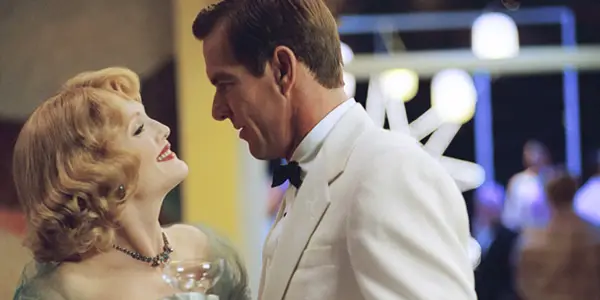
Speaking of Sirk, Kino Lorber have concurrently released Todd Haynes’ Sirkian send-up Far From Heaven, a film that, like its spiritual sister Carol, has amassed something approximating a cult following since its release and now finally arrives on Blu-ray.
Catching up with this film, about a housewife who strikes up a vague relationship with her black gardener after finding out her husband is a closeted gay man, in 2019 may be slightly odd for those familiar and fond of AMC’s Mad Men — both texts about the taboo passions and secret lives of mid-century execs and curious housewives. Unfair as it is to Haynes’ film, it was hard for me to avoid annoying comparisons. But, while they cover the same milieu and moment in American history, their tonal approaches are quite disparate.
Mad Men is more interested in present social history in accuracy, while Haynes, who, as Rosenbaum pointed out, is “accurate about many of the social prisons of American life in the 50s,” but ultimately more concerned with creating an “alluring brand of Hollywood artifice.”
Writing about Sirk, Andrew Sarris said, “Even in his most dubious projects, Sirk never shrinks away from the ridiculous, but by a full-bodied formal development, his art transcends the ridiculous, as form comments on content.” Haynes is more faithful to this approach, to establishing social concerns and extrapolating on their inherent sadness with his particularly distanced melodrama.
Far From Heaven is a lovely work and a testament to Haynes’ persistent experimentation, and kudos to Kino who’ve wheeled out a beloved film of this century with a transfer that does justice to the exemplary work of trusty cinematographer Ed Lachman (The Limey, Light Sleeper), whose ornate cranes, vanity mirror compositions, rear projections and characteristic gel work beg for close examination.
Columbus (2017) – Oscilloscope
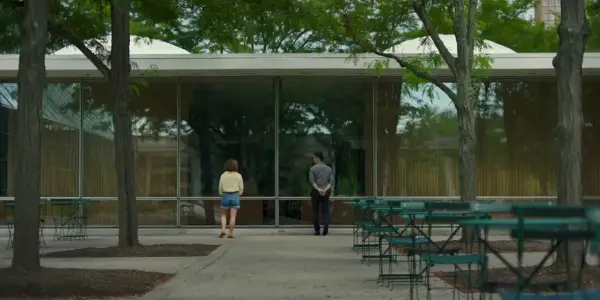
In 2017, the first film from Korean-born film essayist Kogonada, Columbus, was released — an ode to Yasujiro Ozu he wrote while Ozu-based Ph.D. dissertation. A young woman, Casey (Haley Lu Richardson), native to Columbus, Indiana — a strange mecca of modernist architecture — spends a few days walking with Jin (John Cho), who’s in town to visit his estranged, and now fatally ill, father, a local architecture professor.
They walk around Columbus and chat about city structures, life desires and the generational divide between them and their parents — Casey’s relationship with her recovering-drug-addict mother is complex and she struggles with whether to leave town or stay to care for her.
As an Ozu homage, though others have done better (Hou Hsiao-Hsien’s Cafe Lumiere, Claire Denis’ 35 Shots of Rum), it works because he’s not solely attracted to the Japanese director’s prototypical style. Otherwise, the film more resembles Sofia Coppola’s Lost in Translation and owes a lot to it. Richard Linklater’s Before Sunrise is also peppered in, though not nearly as romantic a film.
It’s certainly not a perfect movie, and Kogonada needs the most help in the screenwriting department, but he has a clear point of view and a desire to convey it with delicacy … both of which can feel so uncommon in contemporary American cinema.
Oscilloscope are doing quite the service here for U.S. fans. Though Kogonada’s film came out in August 2017, there had been no physical release of the film in the U.S. Until last month, the release via U.K.’s Network was the only option available, and that was region-locked. Per usual, the packaging and artwork have a loving and playful touch. Aside from the film, the disc has some selected commentary from Cho and Richardson, as well as Kogonada’s short film Columbus Story, which is part behind-the-scenes, part anthropology of the city.
Does content like this matter to you?
Become a Member and support film journalism. Unlock access to all of Film Inquiry`s great articles. Join a community of like-minded readers who are passionate about cinema - get access to our private members Network, give back to independent filmmakers, and more.













